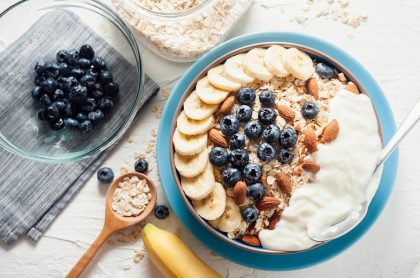The Gut Connection: Part 4 – The Obesity Connection


We now know that digestive health affects brain, thyroid, and immune function. But did you know that an unhealthy gut can also promote obesity?
What’s more surprising is that gut imbalances can cause weight gain regardless of caloric intake. This means you could be eating a healthy amount of calories (maybe even fewer than your body requires) and still gain weight. How is that possible?
The answer lies in something known as the microbiome. Overall health, including a healthy weight, is largely controlled by these trillions of bacteria and other microbes that live in our intestines. These organisms help us absorb food, maintain regular bowel movements, regulate the immune system, and produce essential vitamins such as biotin, folate, and vitamin K. Some forms of bacteria are health promoting, while others (especially when present in larger than normal amounts) can be quite damaging.
How Does the Microbiome Influence Weight?
A growing body of research suggests that the makeup of your individual microbiome influences the way you digest and process food. Certain strains of bacteria are associated with a healthy body weight, while others are associated with obesity. Studies have shown distinct differences between the bacterial makeup of people with a normal body weight and people who are obese.
Overweight and individuals suffering from obesity tend to have less diversity, or fewer species of gut bacteria. Lean individuals have more diverse strains of bacteria and also have higher levels of bacteroidetes, a type of microbe that breaks down carbohydrates very efficiently. Higher levels of bacteroidetes means carbohydrates are more likely to be digested properly and burned as energy versus stored as fat.
Having enough healthy bacteria is also important because they metabolize fiber and complex carbohydrates into short chain fatty acids (SCFAs). These SCFAs are a direct fuel source for the cells in the small intestine, allowing them to digest and absorb nutrients properly. They also increase enzyme activity in the liver and muscles, resulting in better blood sugar control and insulin sensitivity. Maintaining healthy blood sugar and insulin levels means your body is more likely to burn carbohydrates for energy, versus storing them as fat.
As mentioned in previous articles in this series, healthy bacteria help maintain the barrier lining your small intestine, keeping inflammatory chemicals from entering the bloodstream. If there’s a lack of healthy bacteria, the gut lining starts to break down and become “leaky.”
Harmful bacteria in your gut produce toxins called lipopolysaccharides (LPS) that have been linked to inflammation, insulin resistance, blood sugar imbalances and obesity. As soon as toxic substances like LPS enter the blood stream, your body attempts to get rid of them. If levels of LPS are too high, the body will “bubble wrap” them in fat to keep them from damaging vital organs. This can lead to weight gain and make the weight harder to lose as the body attempts to maintain fat stores for protection.
What Causes Imbalances in the Microbiome?
There are a number of factors that can disrupt bacterial balance and promote weight gain and obesity, even in infants. Studies have shown that both formula-fed babies and babies delivered by C-section have a higher risk for obesity than those who are breast-fed or delivered vaginally. When babies are born vaginally, they swallow bacteria that help “jumpstart” their own microbiome. C-section babies miss out on this first dose of probiotics. Formula fed babies do not receive immune boosting substances found in breast milk that nurture beneficial bacteria and combat harmful ones.

Widespread use of antibiotics is another top contributor to an unhealthy microbiome. While antibiotics are lifesaving, they kill off healthy bacteria along with the kinds that make us sick. Over-prescription of antibiotics promotes more resistant, aggressive strains of bacteria that make it difficult for healthy strains to thrive.
Even if you avoid prescription antibiotics, you may still be ingesting them through meat products. The food industry is heavily reliant on antibiotics to prevent infection and disease in livestock. In fact, 80% of the antibiotics sold in the United States go toward keeping animals healthy in dirty, overcrowded conditions.
A diet high in processed foods has also been linked to a less diverse microbiome. Processed foods tend to be low in fiber, which is problematic since fiber is needed to produce the SCFAs that keep your digestion and metabolism in check. They also contain chemicals and added sugars that lead to lower levels of healthy bacteria.
How Can I Promote Better Digestion and a Healthy Weight?
Add fermented foods and a high quality probiotic. Adding healthy bacteria to your diet and supplement regimen can help “crowd out” the bad guys. Fermented foods such as yogurt, kefir, sauerkraut, kimchi, raw apple cider vinegar, and kombucha are great to include daily. Probiotics can be helpful with more severe digestive issues, as they provide a higher dose of beneficial bacteria than you’d find in food sources.
Determine and avoid food allergies/sensitivities. When you eat a food that you are sensitive to (even if it’s not a true or life-threatening “allergy”) it triggers an immune response. This can inflame the intestinal lining, causing LPS to escape into the bloodstream and trigger fat storage. An elimination diet is a great place to start.
Choose responsibly raised meat. With antibiotic use so widespread, it’s wise to avoid any extra exposure. USDA organic meats are ideal, or look for meats labeled “no antibiotics ever” or “raised without antibiotics.”
Focus on complex versus simple carbohydrates. Complex carbohydrates (vegetables, fruits, legumes, and whole grains) contain more fiber, while simple carbohydrates (white bread, pasta, cereal, and sugar) contain very little. Fiber feeds healthy gut bacteria and increases production of the SCFAs that help with nutrient absorption and blood sugar regulation.
Avoid artificial sweeteners. Artificial sweeteners such as aspartame, sucralose and saccharin reduce healthy bacteria in the gut, which can lead to inflammation, blood sugar imbalances, and weight gain. They can also trigger cravings for high sugar foods, the very thing they were meant to replace.
Click on the links for Miranda’s previous articles in the series on the brain, thyroid and immune system.
Similar articles
-
Your health destiny is not your child’s health destiny
inAre you thinking about having kids, but have poor health yourself? Do you want to give your child a better health destiny than your own?
-
Part 2: Irritable Bowel Syndrome (IBS)? Kimsey to the rescue!
inNow that we’ve discussed how to tell if you’re suffering from IBS and what might be causing it, we’ll take a look at the risk factors leading to the illness and some of the best IBS treatment, both natural and conventional.
-
Have Irritable Bowel Syndrome (IBS)? Kimsey to the rescue!
inIn the first part of a two-article series, Master Nutrition Therapist Kimsey Self describes how you can know if you have IBS or if you’re likely to suffer from it.
More in Health
-
Do you really need supplements for a healthy lifestyle?
inMany people regularly ask, “do I really need supplements for a healthy lifestyle?”, and if so, which are the best ones to take?
-
Biohack: how to reap the top health benefits of grounding!
inI’m sure you’ve all heard of grounding, it’s been quite the buzz word recently. But what is it, really, and what are the health benefits of grounding?
-
Discover the power of conscious deep breathing on your health
inBreathing is something the body does without any conscious effort, but the power of conscious deep breathing is definitely no joke!

















